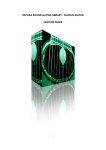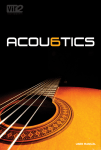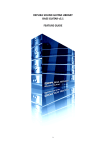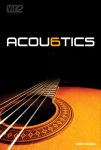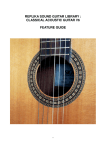Download Fender MUSTANG 3 User's Manual
Transcript
FENDER MUSTANG PRO-GUITAR MIDI User Guide REVISION: 01 Date: 07/16/10 Introduction .......................................................................................................................................................... 3 What is MIDI? ....................................................................................................................................................... 3 Features .................................................................................................................................................................. 3 Getting Started ......................................................................................................................................................4 Control Surface Functions in MIDI Mode ..................................................................................................5 Connection Ports................................................................................................................................................. 6 Working in a MIDI Studio ................................................................................................................................6 Connecting the Mustang Guitar to a Personal Computer....................................................................6 Connecting to a MIDI Sound Module ..........................................................................................................7 External Pedal Functionality ..........................................................................................................................8 Play Modes .............................................................................................................................................................8 Strum Mode ...........................................................................................................................................................8 Synth Mode ............................................................................................................................................................8 Understanding the Controls ...........................................................................................................................9 Change Octave ......................................................................................................................................................9 Change Program ..................................................................................................................................................9 Panic Function .....................................................................................................................................................9 Accelerometer ...................................................................................................................................................10 Default Settings .................................................................................................................................................11 LED Indicators ...................................................................................................................................................12 FAQ .........................................................................................................................................................................13 INTRODUCTION The Rock Band 3 Fender Mustang Pro-Guitar isn’t just video game controller; it is also a genuine musical instrument that can be used in your MIDI Studio or in a live performance. We created this manual to express the Rock Band 3 Fender Mustang Pro-Guitar’s capabilities as a MIDI device. Once you are familiar with the topics covered in this user guide, you should have an understanding of: RB3 Mustang Guitar Features and Functions RB3 Mustang Guitar Interface MIDI How to use the RB3 Mustang Guitar in a MIDI Studio Use as a Software MIDI Controller Use as a controller for standalone hardware sound modules WHAT IS MIDI? MIDI is the abbreviated term for Musical Instrument Digital Interface. MIDI is a language that provides a way for digital musical instruments (or other MIDI compatible devices) to communicate with one another. MIDI is not audio; the information contained within MIDI messages is used to trigger sounds from MIDI-compatible sound modules. The Rock Band 3 Fender Mustang Pro-Guitar supports a variety of MIDI functions. When used as a MIDI Controller, it is like a remote control that triggers sounds from external hardware or software devices. When you press a key, MIDI data is sent from the MIDI Output port. The data travels to the other MIDI devices via a 5-PIN MIDI cable. When the data is received by the device, sounds will be triggered and passed to your audio system. FEATURES 6 Velocity-Sensitive Strings 102 Simulated Fret Buttons TRS Port for connecting Stomp and/or Expression Pedals Compatible with MIDI software sequencers and synthesizers Compatible with standalone MIDI sound modules Battery Powered GETTING STARTED Graphic: guitar battery compartment The guitar will need batteries to function in MIDI mode. To get started, please follow the steps below: 1. Place 3 AA batteries in the correct position in the battery compartment located on the bottom side of the guitar. 2. Slide the power switch to ON (PlayStation 3/Wii) or press and hold the Xbox Guide button (Xbox 360). 3. Connect the guitar to a MIDI sound module or a MIDI interface with a 5-Pin MIDI Cable. CONTROL SURFACE FUNCTIONS IN MIDI MODE Feature 1 Fret Board Function 2 Strings 3 LED Indicators 4 5 Synth Mode Shift 6 Foot Controller 7 Channel Volume 8 Expression 9 Octave Increment 10 Program Decrement 11 Program Increment 12 Octave Decrement 102 buttons to simulate fretting action 6 velocity-sensitive guitar strings 4 LEDs to indicate various guitar states or user actions Enable/Disable Synth Mode Provides secondary functions for other buttons Change pedal function to foot controller Change pedal function to channel volume Change pedal function to expression Increase current octave number Decrease current program number Increase current program number Decrease current octave number CONNECTION PORTS Graphic: guitar side ports Port Function MIDI Out Port Pedal Port Outputs MIDI Data Allows the use of an optional pedal for extra functionality such as expression, modulation and channel volume WORKING IN A MIDI STUDIO Common MIDI Studio setups include a MIDI Controller (Rock Band 3 Fender Mustang Pro-Guitar), personal computer, MIDI sequencing software and/or a standalone MIDI sound module. CONNECTING THE MUSTANG GUITAR TO A PERSONAL COMPUTER When you want to use the guitar as a controller to trigger sounds from your MIDI sequencing software or your computer’s onboard MIDI synthesizer, a connection from the guitar’s MIDI output port to a MIDI Interface (such as the USB MIDI Sport 1x1) will be necessary. Alternatively, the guitar can be connected to a sound card or an audio interface as long as they are equipped with a MIDI input port. Audio output will be provided by the sound card or audio interface. When using the guitar with MIDI sequencing software applications, be sure to consult the application user guide to ensure proper connectivity and communication. CONNECTING TO A MIDI SOUND MODULE To connect to a MIDI sound module, connect one end of the MIDI cable to the MIDI Out port on the guitar, and the other end of the cable to the MIDI In port on a sound module. Audio output will be provided by the sound module. When using the guitar with a sound module, be sure to consult the sound module user guide to ensure proper connectivity and communication. EXTERNAL PEDAL FUNCTIONALITY The pedal jack supports an optional analog Expression Pedal and/or digital Stomp Switch. The analog expression pedal has three available functions – Expression, Channel Volume, and Modulation. To change pedal function, press the appropriate button on the directional pad. Pedal Type Analog Expression Digital Stomp Pedal Controls MIDI Assignment Default: Expression Controller (can be changed using buttons 3, 4 and 6) Damper Pedal/Sustain PLAY MODES STRUM MODE Strum Mode is the default way to use the Mustang Guitar. To generate MIDI notes in Strum Mode, you must strum a string. A MIDI note will be generated based on the fret that is held down closest to the strings. Hammer-‐ons and pull-‐offs cannot be played in this mode. SYNTH MODE In Synth Mode, strumming the string is unnecessary to generate notes. Changing which fret is held down will also generate a note. The velocity of generated notes is based on the last strum of the fret’s string. To play an open string, you must strum a string. Play Modes Strum Mode Synth Mode Note Generation Strumming string Note Termination Note Velocity Hammer-Ons/Pull-Offs Changing fret Based on current strum Not supported Changing fret or strumming string Releasing all frets on a string Based on last strum Supported UNDERSTANDING THE CONTROLS CHANGE OCTAVE Incrementing or decrementing octave adds or subtracts 12 to the current MIDI note value. A maximum of 4 changes can be made to the octave in either direction from the default. Any notes that fall out of the MIDI note range of 0 – 127 will assume the value of either 0 or 127 respectively. Pressing both the octave increment and decrement buttons simultaneously will reset the current base octave to the default. CHANGE PROGRAM The default Program value of 28 (Electric Guitar – Clean) is adjustable from 1 to 127 using the Program increment and decrement buttons. Pressing both the Program increment and decrement buttons simultaneously will reset the current Program value to the default of 28. Program changes are transmitted on channels 1 - 6. PANIC FUNCTION To immediately stop all notes across all channels press buttons 4, 5, and 8 simultaneously. ACCELEROMETER Rotational motion of the guitar can activate certain MIDI functions. To toggle these functions, the correct button combination must be pressed. Axis X Y Z Accelerometer MIDI Mapping Output Toggle Key MIDI Assignment Combination Buttons 5 and 12 Buttons 5 and 11 Buttons 5 and 9 Modulation Expression Pitch Bend DEFAULT SETTINGS Transmit on Mode Accelerometer Program Analog Pedal Function MIDI Channels 1 – 6 Strum Disabled Value 28 (Electric Guitar – Clean) Expression LED INDICATORS The four Player LEDs are used to indicate various internal states and to acknowledge actions that the user has performed. The LED behaviors are as follows: Note: LEDs revert back to their static indicator state, completion of any sequence User Action User… , upon Resulting LED State (PS3/Wii illustrated to show player #s) LED Key = LED Off = LED On Turns Guitar ON Xbox 360 - holds Guide button for 2 seconds PS3/Wii - slides power switch to ON = LED Unchanged Display Count: Continuous Turns Guitar OFF Xbox 360 - holds Guide button for 2 seconds PS3/Wii - slides power switch to OFF Display Count: Continuous Synth Mode Display Count: Continuous 100ms Toggles Accelerometer X Axis (Modulation) Output 100ms Display Count: Continuous Enable Disable Toggles Accelerometer Y Axis (Expression) Output Display Count: Continuous Enable Disable Toggles Accelerometer Z Axis (Pitch Bend) Output Presses either Octave or Program increment button Display Count: Continuous Enable Disable Display Count: 1x 100mS 100mS 100mS Presses either Octave or Program decrement button 200mS Display Count: 1x 100mS 100mS 100mS Resets either Octave or Program setting 200mS Display Count: 1x 100mS 100mS 200mS FAQ 1. Can I use the USB dongle that I use to play Rock Band to connect to a PC with MIDI functionality? No, to use the MIDI functionality of the guitar, you must connect to another device using the MIDI Out port on the guitar. 2. If the guitar is considered a ‘real instrument’ why doesn’t it make any sound? This is true for many MIDI Controllers. One of the key features of a MIDI controller is its ability to generate sounds through other devices such as: drum machines, organs and sound modules. One controller can be used to drive all of those devices and be small enough to carry.













